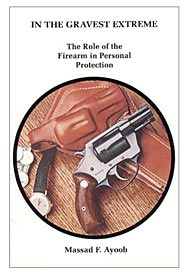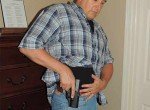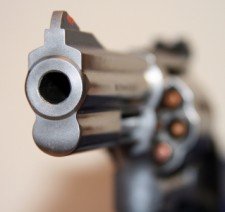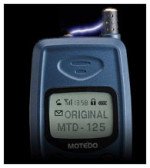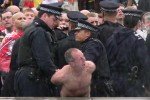In the Gravest Extreme by Massad Ayoob was a phenomenal book written by police training expert Massad Ayoob. Although the book is now out of print, the tome still holds many valuable lessons. Ayoob wrote this book as an introduction to the defensive use of firearms way back in 1980. Ayoob discusses the legal implications and practical aspects of owning and using a firearm … [Read more...]
Police Officers Should Carry Guns Off-Duty
I have talked about this before: every police officer should carry at least one firearm off-duty. There are many specific reasons for carrying a handgun when you are not on the job, but they all boil down to one reason: you may need it. There have been plenty of instances where armed, off-duty officers were able to take action to stop a violent crime and defend themselves … [Read more...]
Suicide Jumpers: An EDP Police Officers Must Train For
Police officers often respond to calls involving EDPs: Emotionally Disturbed Persons. Some of these EDPs are high on drugs, mentally ill, or severely depressed about some event in their life. Suicidal subjects are one of the types of EDP that we have to deal with. Often times a suicidal subject does not have any real intent to harm themselves; they are just looking for help … [Read more...]
Is the Use of Light a Use of Force?
Several years ago, I read an article called "Use of Force and High Intensity Tactical Police Flashlights: Policy Concerns." Since then I have seen it re-printed in various other locations. In the article, R. Paul McCauley, Ph.D., a criminology professor at a university in Pennsylvania, opines that: I don't know what background, if any, McCauley has in modern police … [Read more...]
Car 54…Where Are You?: Update Your Dispatchers on Your Location
I know... it seems like a no-brainer. When you get out of the patrol car, let your dispatchers know where you are. Recruit officers have this drilled into their heads by their FTOs, and we know it makes sense. After all, you never know what may happen at any given moment, and in the middle of a fight is not a good time to start trying to give dispatch you location. However, … [Read more...]
Identify Your Target: Use Your Flashlight
It is well established that as police officers, we often work in diminished light situations. Even officers assigned to day watch have to go into dim areas, such as abandoned buildings, warehouses, and closets, looking for suspects. Police officers have been trained, however, that using your flashlight can make you a target. Therefore, many instructors have encouraged police … [Read more...]
Disguised Weapons: A Hidden Threat to Police Officer Safety
Police officers often find weapons on suspects during pat-downs and post-arrest searches. Sometimes the weapons are firearms, and other times the weapons are knives, ice picks, brass knuckles, and the like. These are generally no problem to spot and identify, right? Not always. There are many criminals walking around with weapons that are disguised as mundane, common items. … [Read more...]
Contact and Cover: Are Police Officers Doing It Right?
For more than two decades, police trainers have preached the virtues of using "contact and cover." Done correctly, contact and cover offers a very safe method of dealing with suspects. But, are we correctly implementing what we were taught? Contact and cover is a tactic that is used by two patrol officers when encountering a subject of investigation. The contact officer … [Read more...]
Recognizing Emotionally Disturbed Persons
Emotionally Disturbed Persons, or EDPs, are common encounters for the street level police officer. EDPs fall into three general categories: chemical abusers, short term, and long term. Recognizing what category the EDP falls into may help you in how you deal with the subject. The first category is the chemical abuser. The folks in this category include your crack-heads, … [Read more...]
Spotting An Armed Subject
An unfortunate truth about police work is there are evil people out there who would like to kill us, simply because we are cops. Given the opportunity, some of them will try. So, we need to take every opportunity to spot danger before it is too late. One of the more useful skills an officer can develop is learning how to spot someone carrying a firearm. Several agencies, … [Read more...]
